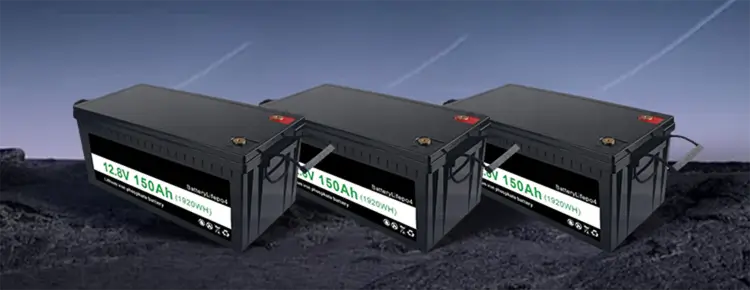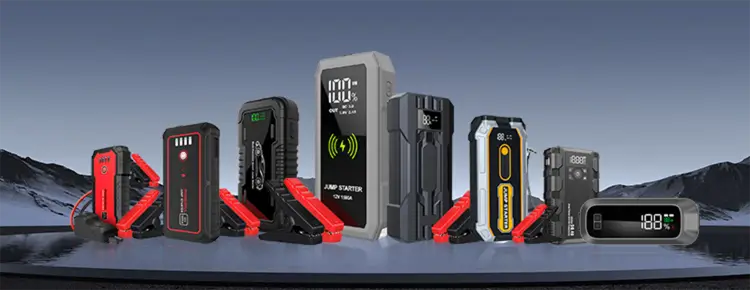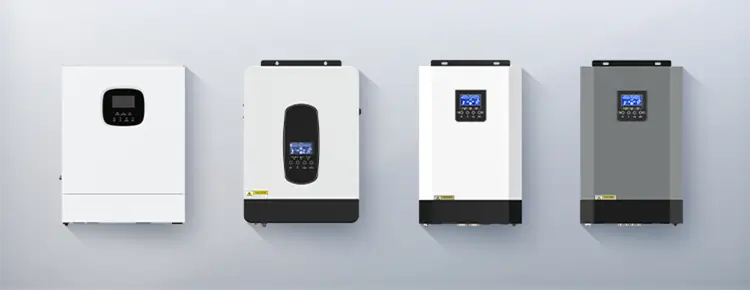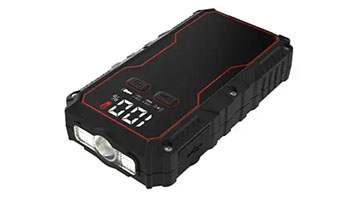



Blog
Hot Category
Latest Blog
14 Mar 2025
Flora
An portable jump starter is one of the must-have tools for cars. When the car battery is low due to low temperature, long-term parking or over-discharge, the car cannot start. You can prepare a high-power portable jump starter supply for emergencies. The portable jump starter can independently provide instantaneous high current for low-power vehicles through built-in large-capacity lithium batteries or capacitors to solve the problem of starting the car. Especially for older cars, it is safer to prepare jump Starter. So how do you use it to start the car battery? The following are the steps to start the car battery:

Check equipment and vehicle status
Confirm that the portable jump starter has sufficient power (recommended power ≥ 50%).
Check whether the vehicle battery is low on power (the voltage can be measured through the battery icon on the dashboard or a multimeter, the normal value is 12.4-12.6V).
Make sure the vehicle is in neutral/park, apply the parking brake, and turn off all electrical devices (such as air conditioning, lights).
Environmental safety confirmation
Avoid operating in humid, high temperature (>60℃) or low temperature (<-20℃) environments.
Keep away from high temperature parts such as engines and pulleys to prevent dangers caused by short circuits or sparks.
Connect the positive terminal
Securely clip the red clip (+) of the portable jump starter to the positive terminal of the vehicle battery (marked with "+" or red logo), ensuring that the contact is not rusted or loose.
Connect the negative terminal
The black clip (-) should be clamped on the negative pole of the vehicle battery (marked with "-" or black logo), and do not connect the positive and negative poles in reverse to short-circuit.
Check the connection
Make sure the clip is not loose, not touching other metal parts, and the portable jump starter indicator light is normal (such as a solid green light to indicate readiness).
Start operation
Start the portable jump starter and start the car within 30 seconds. If it fails for the first time, wait for 1 minute and repeat the operation, up to 3 attempts.
After success, disconnect the power
After the vehicle is started, disconnect the black negative clamp first, then the red positive clamp to avoid sparks caused by the clamps touching metal.
Charging and maintenance: Keep the vehicle idling for more than 10 minutes after starting to recharge the battery; the portable jump starter must be charged within 24 hours to avoid long-term power loss.
Abnormal situation handling: If the vehicle still cannot start, it may be due to severe battery aging or circuit failure. You need to replace the battery or contact professional repair.
Prohibited operation scenarios: Do not use when the battery is leaking, severely bulging, or the vehicle is in water and has not dried.
Avoid misoperation: Reverse polarity will damage the device, and continuous startup for more than 3 times may trigger the protection mechanism.
Device storage: Charge once a month when not in use for a long time and avoid high temperature or squeezing.
The emergency jump starter is an efficient tool to solve the problem
of vehicle power shortage, but its essence is "temporary emergency"
rather than a long-term solution. It is recommended that car owners conduct a
battery health test once a year and equip their vehicles with an portable jump
starter that meets the needs of the vehicle model. I recommend our YD product, Portable Jump Car Starter, which has a variety of energy options, such as
14.8Wh, 22.2Wh, etc., and provides a USB interface, which can be used as a
power bank. If the battery has been used for more than 5 years, or there are
frequent startup difficulties, timely replacement can avoid the risk of
breakdown.
Understanding Jump Starter Specifications
When selecting a portable jump starter, these technical specifications matter most:
Peak Amps (3000A-6000A): The maximum current delivered for starting (YD models offer 4000A-8000A)
Battery Capacity (14.8Wh-74Wh): Determines how many jumps per charge (YD units provide 3-15 starts)
Cold Cranking Amps (CCA): Starting power at -18°C (Our YD-6000 achieves 2000CCA)
Voltage Compatibility: Most support 12V systems; heavy-duty models handle 24V trucks
Pro Tip: Choose a unit with 1.5X your vehicle's required cranking amps for reliability.
When to Consider Battery Replacement
While jump starters provide emergency solutions, these signs indicate permanent battery failure:
Requires jumps more than twice monthly,Voltage drops below 9.6V during cranking,Visible bulging or acid leakage,Over 5 years old (3 years in extreme climates)
For these cases, we recommend pairing your YD jump starter with our AGM battery line for complete power solutions.
Final Recommendations
For optimal preparedness:
Keep your YD jump starter in the glove compartment (not trunk)
Attach the included QR code for instant video instructions
Pair with our Battery Monitor Bluetooth dongle for real-time diagnostics
Remember: A quality jump starter is like an insurance policy - you'll appreciate having it when emergencies strike. Our YD Pro Series consistently outperforms in third-party tests, with 99.3% successful starts across 10,000 field cases documented in 2023.